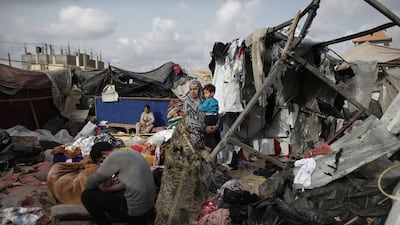Live updates: Follow the latest on Israel-Gaza
Fifty more bodies were recovered from Jabalia on Sunday as Palestinian paramedics and civil defence teams scoured the flattened remains of Gaza's largest refugee camp following an Israeli withdrawal last week.
Dozens of people are still missing, according to the official Wafa news agency, which said schools, hospitals and shelters “were not spared from bombing and destruction”.
The remains of the camp resemble the aftermath of a “devastating” earthquake, it added, saying the army operated a scorched earth policy during the 20-day operation.
The bodies of 70 people, including 20 children, were recovered from the camp on Friday.
Images taken by local journalists showed widespread destruction across the camp, with displaced civilians combing through the mounds of rubble that used to be their homes.
About 200,000 people were displaced from the camp during the operation, according to Wafa.
About 70 per cent of the camp was destroyed by the army, Palestinian officials recently told The National, while residents described the aftermath “like Judgement Day”.
Two destroyed ambulances have also been found in the camp by the Palestinian Red Crescent.
At least 36,439 people have been killed across Gaza since the war began on October 7, with another 82,627 wounded, according to figures from the local health authorities.
Also on Sunday, several people were killed and wounded in shelling on the vicinity of Gaza city's university college in Al Sabra neighbourhood.
Shelling was also reported in Al Zeitoun, where homes in the Old City and the eastern neighbourhood of Al Daraj were hit.
Several people were wounded and homes destroyed in Rafah’s Al Brazil neighbourhood, while artillery shelling struck western parts of the city, Wafa added.
It did not give an exact death toll for the attacks.
The attacks came as mediators urged Israel and Hamas to accept a ceasefire deal, a three-phase proposal which would include an initial six-week halt to fighting and the exchange of Israeli hostages and Palestinian detainees.
On Saturday, the US, Qatar and Egypt called on both parties to “finalise the agreement” outlined by President Joe Biden, saying the deal serves “multiple interests” and will bring “immediate relief” to Palestinian civilians and Israeli hostages.

An attack on Israel by Hamas fighters that day killed about 1,200 people and about 240 were taken hostage.
Thousands of Gazans are reported missing under the rubble of buildings, and almost all hospitals that usually track the number of dead have been destroyed and forced out of service.
Almost all of Gaza's residents have been displaced, many several times as Israeli forces push through the enclave.
The Israeli army entered Rafah, on the Egyptian border, last month despite widespread international pleas to spare the city, which served as the last refuge for more than a million displaced Palestinians from across Gaza.
Tanks have been reported in the city centre and western neighbourhoods of Rafah, where residents have reported continuous shelling and air strikes.
Worsening malnutrition
More than one million people have fled Rafah in recent weeks, according to the UN's aid agency for Palestinian refugees.
On Saturday, the World Health Organisation said almost no healthcare services are available in the city, after the Al Helal Al Emirati maternity hospital was forced out of service.
Two people were injured in an attack on the hospital, the only facility for pregnant women in Rafah, on Thursday, regional director Hanan Balkhy said on X.
“Gaza’s health system cannot withstand recurring assaults while relying on sporadic aid. Our humanitarian efforts, impeded by insecurity, movement restrictions, and limited access, cannot replace a fully functional health system,” she said.
Continued attacks on Rafah are also a worsening famine across Gaza, declared by the UN's World Food Programme last month.
A medical post established by Save The Children to address malnutrition in Rafah's Tal Al Sultan neighbourhood was forced to close last week following an Israeli attack, a representative said on Sunday.
“Gaza is witnessing the worst of the worst levels of malnutrition, especially child malnutrition, and it’s entirely man-made,” Alexandra Saieh told Al Jazeera.
Ms Saieh said there might be “an acceleration of deaths due to malnutrition, starvation, disease and dehydration, possibly even higher than what we are already seeing, which is just the tip of the iceberg”.
“We actually fear that the situation is much worse,” Ms Saieh said.


